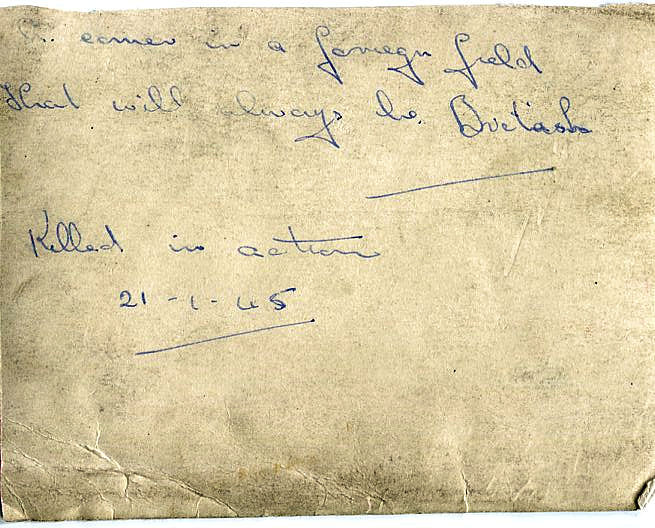David O’Connell was killed on 21 January 1945. He was 24 years old. His parents, Cornelius and Eliza, lived in Lewisham in South London, which is perhaps where he came from.

What led me to David O’Connell was acquiring the beautiful battered old photograph of his grave, taken soon after his burial, lying in a snowy cemetery, marked with an immense central wreath of flowers and many other smaller floral tributes. He must have been very highly thought of, either personally or in a symbolic capacity as a member of the liberating British forces.
There is no information currently known about how he died, or what unit he was with. With an RAF rank of LAC (Leading Aircraftman), he may well have been ground crew working on some aspect of airfield construction or maintenance. This seems very likely because the Schoonselhof cemetery record show a number of RASC (Royal Army Service Corps), REME (Royal Mechanical and Electrical Engineers) and Pioneer Corps personnel being killed around the same time (the Pioneer Corps often carried out construction work). Clearly Belgium was still a very dangerous place to be in late January 1945, even for non-combatants. Although much of the country had been liberated, it was not officially clear of German troops until 4 February.
On the back of the photograph of his grave, probably written by a comrade who saw the grave, is a touching faded message.

David’s grave appears to be in an older cemetery, but there is no mention in the CWGC records of his grave having been relocated after the war when the Graves Service came to rationalise British burial sites. He is recorded as being buried in Schoonselhof Cemetery at Antwerp.
When the temporary wooden cross was replaced by the permanent headstone, the epitaph chosen, probably by his parents, was:
ETERNAL REST GIVE UNTO HIM, O LORD
AND LET PERPETUAL LIGHT SHINE UPON HIM.
R.I.P.
